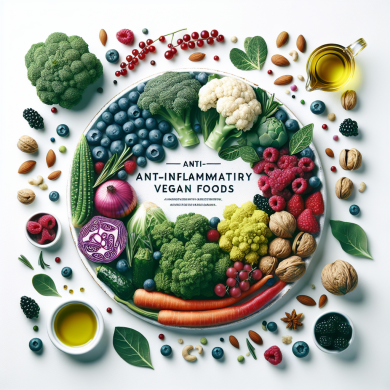Discover the Surprising Benefits of Vegan Diets
Introduction to Vegan Diets
The vegan lifestyle has gained considerable attention and popularity over the past few decades. While the ethical considerations of avoiding animal products are often at the forefront of this choice, the health benefits associated with a vegan diet are equally compelling. A vegan diet, which excludes all animal products, focuses on plant-based foods such as fruits, vegetables, grains, nuts, and seeds. While some still question whether a vegan diet can provide all necessary nutrients, emerging research highlights a plethora of surprising benefits that this lifestyle can offer.
Nutrient-Rich Diet
One of the primary advantages of a vegan diet is its richness in nutrients. By including a wide variety of plant-based foods, vegans often consume higher levels of dietary fiber, antioxidants, vitamins such as A, C, and E, and minerals like magnesium and potassium. These nutrients are essential for maintaining optimal health and preventing chronic diseases.
High in Fiber
A vegan diet is typically high in dietary fiber, found abundantly in fruits, vegetables, legumes, and whole grains. Fiber plays a crucial role in promoting healthy digestion, preventing constipation, and regulating blood sugar levels. Moreover, a fiber-rich diet is associated with a reduced risk of cardiovascular disease, colorectal cancer, and type 2 diabetes.
Rich in Antioxidants
Antioxidants are substances that protect cells from damage caused by free radicals, potentially reducing the risk of chronic diseases. Vegan diets, particularly those rich in fruits and vegetables, are high in antioxidants, helping to combat inflammation and oxidative stress. This may contribute to a reduced risk of chronic conditions such as heart disease and cancer.
Weight Management
Adopting a vegan diet can be an effective strategy for weight management. Studies have consistently shown that vegans tend to have lower body mass indexes (BMIs) compared to omnivores. Several factors contribute to this phenomenon.
Lower Caloric Density
Vegan diets are typically lower in caloric density, meaning they provide fewer calories per gram of food. This is largely because plant-based foods like fruits and vegetables contain high water and fiber content, which helps promote satiety and reduce overall calorie intake. Consequently, individuals following a vegan diet may find it easier to manage their weight and avoid overeating.
Improved Metabolic Rate
Research suggests that a vegan diet may enhance metabolic rate, leading to increased calorie expenditure at rest. This can be attributed to the high levels of dietary fiber and complex carbohydrates consumed, which require more energy to digest and metabolize compared to processed foods high in saturated fats.
Reduced Risk of Chronic Diseases
A well-planned vegan diet can significantly reduce the risk of several chronic diseases, which are prevalent in societies consuming diets high in animal products.
Cardiovascular Health
Heart disease is a leading cause of mortality worldwide, and diet plays a critical role in its prevention. A vegan diet, which is low in saturated fats and cholesterol, and high in heart-healthy nutrients like fiber, antioxidants, and unsaturated fats, has been shown to lower blood pressure, reduce cholesterol levels, and decrease the risk of heart disease.
Diabetes Prevention
Studies indicate that a vegan diet may lower the risk of developing type 2 diabetes. The high fiber content helps regulate blood sugar levels and improve insulin sensitivity. Furthermore, plant-based diets are linked to a lower body weight, which is a significant factor in reducing diabetes risk.
Cancer Risk Reduction
Several studies have suggested that a vegan diet may reduce the risk of certain types of cancer, including colorectal and breast cancer. The high intake of fruits and vegetables provides abundant phytochemicals and antioxidants, which help protect cells from damage and reduce cancer risk. Additionally, avoiding processed meats, which have been classified as carcinogenic by the World Health Organization, further decreases cancer risk.
Improved Digestive Health
A vegan diet, rich in fiber and plant-based foods, promotes optimal digestive health. Fiber aids in regular bowel movements and prevents constipation. Additionally, a healthy gut microbiome, fostered by a plant-based diet, contributes to better nutrient absorption and a strengthened immune system.
Gut Microbiome Diversity
The gut microbiome, a community of trillions of microorganisms in the digestive tract, plays a crucial role in overall health. A vegan diet encourages the growth of beneficial bacteria due to its high fiber content, leading to a more diverse and balanced gut microbiome. This diversity is associated with improved digestion, reduced inflammation, and enhanced immune function.
Environmental Benefits
Beyond personal health, a vegan diet offers significant environmental benefits. The production of plant-based foods generally requires fewer resources and generates fewer greenhouse gas emissions compared to animal agriculture.
Reduced Carbon Footprint
Animal agriculture is a major contributor to greenhouse gas emissions, deforestation, and water pollution. By choosing a vegan diet, individuals can significantly reduce their carbon footprint. Plant-based foods require less land, water, and energy to produce, making them a more sustainable choice for the planet.
Conservation of Resources
The production of animal products is resource-intensive, requiring vast amounts of water and land. By adopting a vegan lifestyle, individuals can contribute to the conservation of these precious resources. For example, producing plant-based protein sources like lentils and beans is far more efficient than raising livestock for meat.
Ethical Considerations
While health and environmental benefits are compelling reasons to adopt a vegan diet, ethical considerations also play a significant role. The choice to avoid animal products aligns with a desire to reduce animal suffering and promote animal welfare.
Animal Welfare
A vegan diet is rooted in the belief that animals have the right to live free from harm and exploitation. By avoiding animal products, individuals can take a stand against factory farming practices that often involve cruelty and inhumane treatment of animals.
Compassionate Living
Embracing a vegan lifestyle extends beyond dietary choices to encompass a broader philosophy of compassion and non-violence. Many vegans find fulfillment in knowing that their choices align with their values of kindness and empathy toward all living beings.
Conclusion
The benefits of a vegan diet extend far beyond personal health, encompassing environmental sustainability and ethical considerations. From nutrient-rich foods and weight management to reduced risk of chronic diseases and improved digestive health, the advantages of a vegan lifestyle are both surprising and substantial. By choosing a vegan diet, individuals can positively impact their own well-being, contribute to a more sustainable planet, and promote compassion toward animals. Whether motivated by health, environmental concerns, or ethical beliefs, the decision to embrace a vegan lifestyle can be a transformative journey with numerous rewards.















Add comment